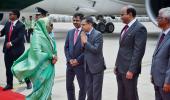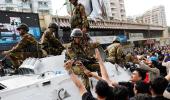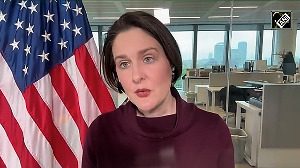'At this moment you cannot give her asylum because if you do, then you are directing public anger against India.'

In a shocking turn of events, Bangladesh Prime Minister Sheikh Hasina was forced to flee her country and go into exile after protestors demanded her resignation. On Sunday, August 4, 2024, around 100 protesters were killed in clashes across the country.
It was only in January this year that Hasina was elected for a fourth consecutive term, and overall fifth, as the prime minister of Bangladesh.
The elections were marred by controversy as her party, the Awami League, did not face a strong opposition after boycott calls were given by the main opposition Bangladesh Nationalist Party led by Khaleda Zia.
The BNP opposed the elections since Hasina's government had jailed many Opposition leaders; according to the New York-based Human Rights Watch, 10,000 Opposition leaders were arrested before the elections.
After Hasina's abrupt exit, the question arises: What next for Bangladesh, and what must India do to tackle the crisis on its eastern border?
Syed Firdaus Ashraf/Rediff.com spoke to Dr Smruti S Pattanaik, a Research Fellow at the Manohar Parrikar Institute for Defence Studies and Analyses, to find out the answers.
What is going on in Bangladesh? It was only in January that Sheikh Hasina won a fourth straight term, thus proving her popularity, and now she has fled the country.
I don't think she was ever looked upon as a popular leader but yes, last year she was looking as if she had things under control.
But one could never rule out the fact that there was a lot of dissatisfaction against her rule.
She treated the media badly and her opponents too by sending them to jail.
The most significant opposition to her was over her corrupt practices in running the government. Bangladeshi newspapers were exposing corruption cases one after another in her government and one example that I must tell you was the corruption by her office peon) (external link). He amassed a fortune in crores (of taka, the Bangladesh currency).
A peon in Hasina's office amassed a fortune in crores?
Yes (Jahangir Alam amassed 400 crore taka and fled to the USA), and the worst part is that Hasina's government never took action against him or the other people who were involved in corruption.
Dissatisfaction against Hasina was brewing and to make matters worse, it was compounded by the Bangladesh Digital Security Act (which allowed police officers to detain people without warrant). Disappearance of her opponents too became very common.
What about the 30 percent reservation quota in civil service and public sector jobs to descendants of those who participated in the movement to free the country from Pakistan? This led to a massive protests last month, killing 133 people. Was it the trigger point that led to her ouster?
Yes, it was a triggering point for sure but that did not change Hasina's policies.
This quota system was reversed in 2018 by the high court and after this when it was re-implemented last month, the students were protesting peacefully (as they felt that this quota system gives undue advantage to families of Awami League members, Hasina's party).
She did not even utter a word to students like, 'I am looking into the matter.' After all it was her government's circular, but rather than cooling off the tensions she made a remark against the protesting students that angered them more. She equated the students to Razakars, a term used for those who collaborated with Pakistan in 1971 to oppose Bangladesh's independence.
These protesting students were not born then and have not seen the 1971 independence movement. And to tell them that she cannot stop reservations or bow to the demand of protestors who were supporters of the Pakistan army in the 1971 killing of Bengalis, was way too much.
(NOTE: The supreme court of Bangladesh last month reversed the quota decision by allowing only 7 percent reserved quota.)
Why was she so adamant about the reservation policy?
The people of Bangladesh felt fake freedom fighter certificates were doing the rounds in the country.
Moreover, the people who were close to her and her party were benefitting due to this reservation.
How many people got the benefit? Nobody knows.
The perception though was created that the people who were close to her and had nothing to do with Bangladesh's freedom movement got reservation benefits.
What about the Bangladesh economy which was doing amazingly some years ago? Why did it go downhill?
The economy was doing well but post-COVID international prices of oil rose and that led to inflation in the prices of essential commodities in Bangladesh.
Also, when Bangladesh was moving from developing country to developed country, the concessions (from donor countries) were getting stopped. The remittance inflow money (external link) too started declining.
Slowdown in the world economy too was a factor that contributed, and especially the slowdown in the Chinese economy, that led to the economic slowdown in Bangladesh.

The fear is that now fundamentalist parties like Jamaat and other right-wing parties in Bangladesh will become more powerful, leading to trouble for India.
Yes, but you cannot do anything about it now. Hasina had become an adamant ruler and even if India wanted the situation to be the same in Bangladesh, it was not possible.
India was never in that kind of position (in the internal politics of Bangladesh).
Her close advisors did not advise her rightly. When the students' protests started, she could have called them in and listened to them. She did not do that.
When students protest, you cannot kill them. Hasina did that.
How did a leader like Hasina lose touch with the ground realities?
In one word, megalomania, and she got supported by the Bangladesh armed forces who too were involved in corruption. They felt that if Hasina stays, they too profit and get their share of money.
Hasina's family -- barring her and her sister Rehana -- were murdered in August 1975. She is Sheikh Mujibur Rahman's daughter. She is a leader who rose from the ground, so what surprises me is that she had no one who could tell her about what was going on the ground.
She destroyed the Opposition completely. The Opposition did strike (and boycotted) during the elections in January this year but nothing happened. Therefore, she miscalculated (and did not read the mood of the public). External power too may be involved. It looks like it now.
Do you feel Pakistan's intelligence agency, the ISI, must also be involved?
Pakistan is a traditional supporter of the Bangladesh Nationalist Party and Jamaat parties which are the Opposition parties of Bangladesh.
Do you see trouble for India in the coming days due to this uncertainty?
I feel there could be a replica of 2007-2008 where a military-backed caretaker government will be in charge.
I was listening to the Bangladesh army chief now and he was saying that he has very limited time in his hands and students must go back home now. The students need to cooperate with the army to bring things in order.
While we in India have had stable governments, why could Bangladesh not be a stable democracy?
In Sri Lanka too the same thing happened. This time in Bangladesh students felt insulted when they were compared to the Razakars.
Sheikh Hasina has come to India. What should India do?
In my personal opinion, India must not give asylum to Sheikh Hasina.
The people of Bangladesh are very angry with her and at this very moment it will not be right to give her asylum.
There have been voices in Bangladesh which have been saying that India is supporting her and she has taken away everything (from them).
There have been narratives in Bangladesh that India is keeping Hasina in power and they are exploiting Bangladesh.
These same narrative people are celebrating victory on the streets of Dhaka today.
At this moment you cannot give her asylum because if you do, then you are directing public anger against India.
Having said that, I don't know what the Government of India is thinking right now.

Did India play a hegemonist role in Bangladesh politics?
No, India kept quiet all the time. It is their internal matter and this is what India has been maintaining since 2015.
India cannot play the role of regional policeman and bring order in the country's neighbourhood. It is their problem. Let the Bangladesh army clean it up.
Hasina is perceived as close to both Prime Minister Narendra Modi and West Bengal Chief Minister Mamata Banerjee.
Yes, she is close to them but the time is not right to provide her asylum. And, to be honest, I do not know what the Government of India is going to do in this matter.
She is a secular leader and she kept in check the Muslim fundamentalists of Bangladesh who were acting against India. In this scenario, do you still feel she does not deserve asylum?
No, she engaged with the Hefazat-e-Islam (an Islamic fundamentalist group) [external link].
She was doing business with them. She allowed and gave weightage to the madrasa students' degrees. She made their graduate certificates equivalent to a BA degree in Bangladesh.
Hasina spoke of secularism but what she practised was not secularism. There was violence against Hindus when she was in power.
Everything was not hunky-dory in her rule.
What about the Hindus of Bangladesh?
The minority population is 8.5 percent out of which 7.5 percent are Hindus. Obviously, they are very vulnerable and spread across Bangladesh.
At this moment we do not know what will be the repercussion on Bangladeshi Hindus with her exit.
The fundamentalists have always equated Bangladeshi Hindus with India.
Will Islamic terrorism rise from Bangladesh in future?
The Bangladesh army is there (to check these forces) and we have good relations with them.











 © 2025
© 2025